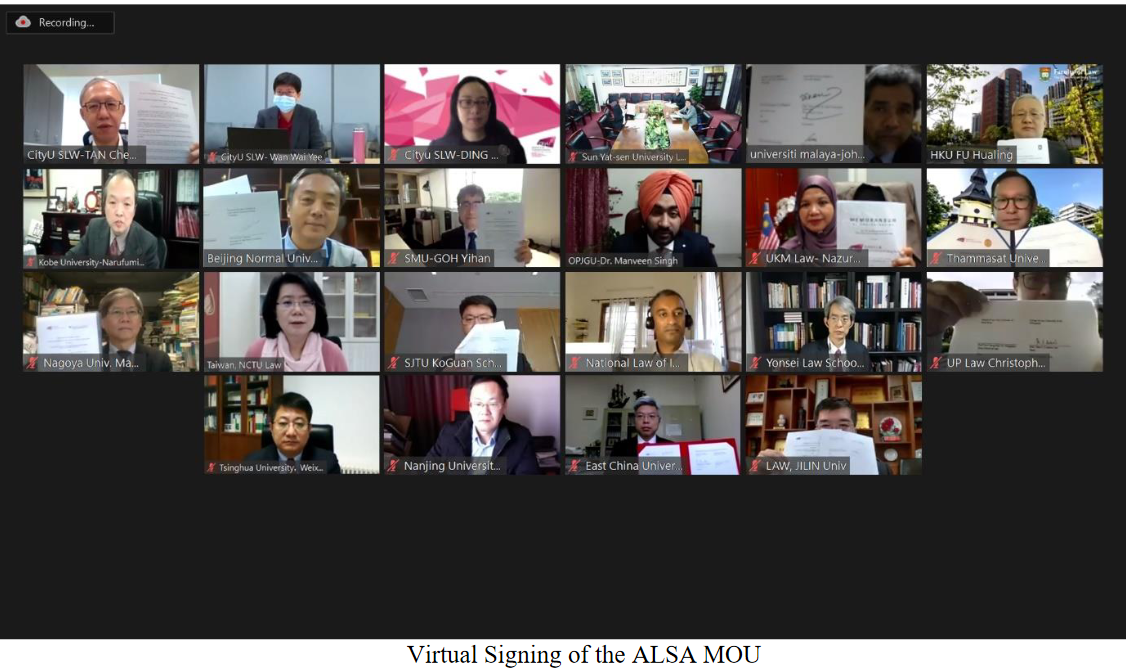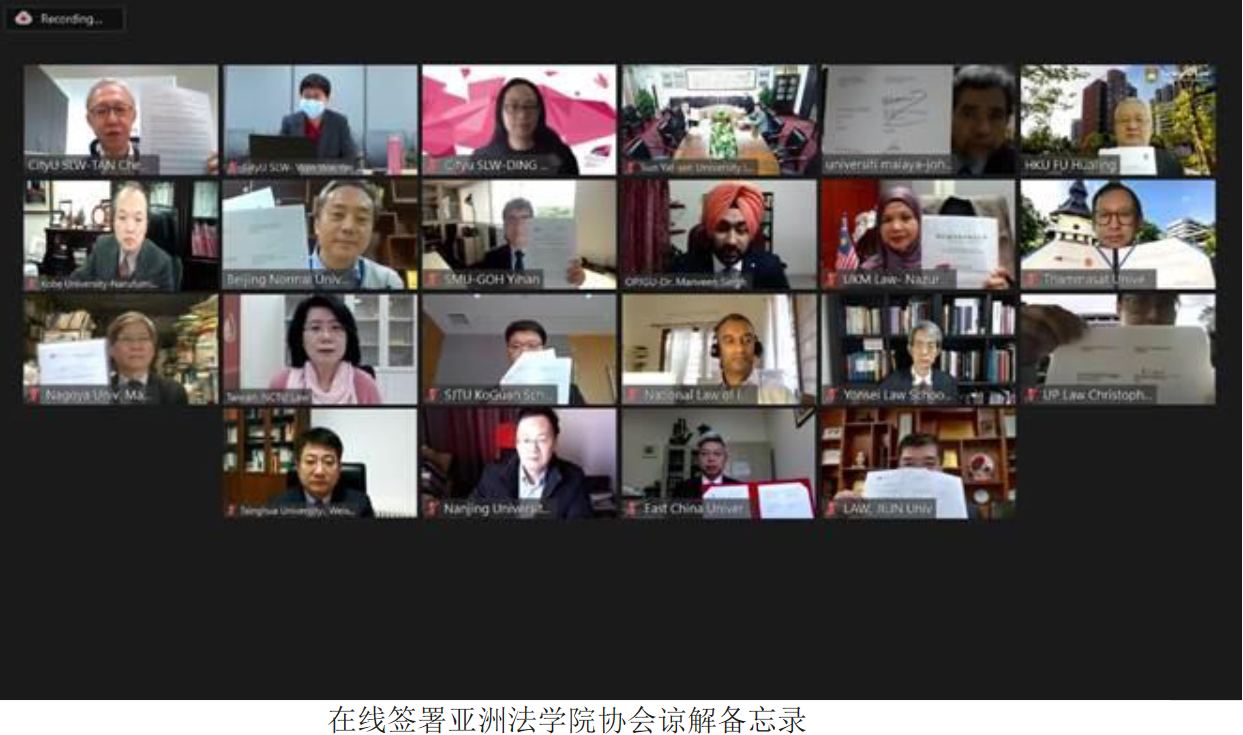Latest News
Insights from the Inaugural Asian Law Schools Association Deans’ Congress on the Future of Law Schools and Legal Education

The Asian Law Schools Association (ALSA) was formally inaugurated on January 15, 2021 with a Deans’ Congress. Deans and academic leaders from the 22 founding institutions participated in a wide-ranging and stimulating discussion on the future of law schools and legal education.
Below are some of the insights from the Deans’ Congress.
1. A strong theme was the pace of digitalization brought about by Covid-19. There was a strong consensus that hybrid learning is here to stay and views were also expressed that it should be the norm moving forward. This poses challenges while at the same time creates exciting opportunities for innovation such as the possibility of “global classrooms”. Strong views were expressed about ALSA pioneering the use of global classrooms, which can take a number of forms.
2. One suggestion that was made and supported by several Deans was that the founding members can contribute courses (that are taught either wholly online or hybrid online and face to face classes) into a basket which students from other founding universities can take online. This will enhance the number of offerings that are available to the students and at the same time allow them to obtain the benefits of taking courses taught by renowned faculty members of the other universities without incurring significant costs of travel and accommodation.
3. An interesting insight was made about how the human-technology interface will become more important. This led to a discussion about some of the implications this would have on the legal profession and by extension law schools. One implication is that much of the tedious and time intensive work done by young associates may no longer be necessary in the medium term. This in turn raises the difficult issue of what law schools can do to ensure that their students continue to have value to law firms and other employers.
4. One theme that was much discussed (and that also may be part of the solution to the preceding issue) is the importance of interdisciplinary education. Law schools should not only be located within their universities but become better integrated with the entire university community. In addition to long-established double degree programs with the humanities, social sciences and business, Asian law schools are starting new double degree programmes in science and technology while increasingly integrating broader perspectives into the law curriculum as a whole. The importance of integration was stressed by many participants so that students do not see interdisciplinary education as separate streams and are able to better integrate the knowledge and perspectives they encounter.
5. In terms of teaching methodology, views were expressed that academic faculty must transform themselves from being “gurus” in the classroom to facilitators to enhance student learning, and in an interconnected world having sufficient courses in the English language is important.
6. A concern shared by some is the impact of Covid-19 on the economy and how this may adversely affect funding for higher education. More efficient cost management could therefore be crucial. The ability to obtain research grants may also assume greater importance. As such grants are competitive in nature, and greater priority may be given to projects focused on health and certain areas in science, to be competitive law-based applications may have to be more interdisciplinary to have greater societal impact.
7. Just as the hybrid mode of learning may become the norm, similar views were expressed about online international conferences and symposia, given also the potentially challenging financial circumstances. A number of participants observed that their experience of such activities has been positive. In addition to financial savings, online conferences and symposia can also be held on a more timely basis and not be limited to windows where there is no teaching.
8. Notwithstanding these advantages, it was observed that time zone differences raised practical problems, and the loss of informal discussion and interaction was a major disadvantage. Such conferences and symposia may therefore have to be held over shorter segments involving more days; greater thought has to be given to using electronic meeting rooms that allow people to spontaneously transition to; and more use be made of pre and post-meets.
About the Asian Law Schools Association
The Asian Law Schools Association is a network of 22 leading Asian law schools dedicated to the development of legal education and scholarship within Asia. It seeks to facilitate collaboration through conferences, symposia, workshops, round tables and other learned activities. More information on ALSA may be found at: https://www.cityu.edu.hk/slw/ALSA/.

亞洲法學院協會於 2021 年 1 月 15 日正式成立,並於當日舉辦院長會議,來自 22 個創始 成員法學院的院長和學術領袖就法學院及法律教育的未來進行了別具啟發性的多角度討 論。
院長會議的意見摘要如下:
1. 2019 冠狀病毒大流行下的數位化發展是熱門的話題,大家普遍認為,混合式教學 已被廣泛應用,亦有聲音表示混合式教學應成為未來常態。此教學模式雖會給行業 帶來挑戰,但同時迎來不同創新機遇,例如普及「全球教室」的可能性,成員就亞 洲法學院協會首創不同形式的全球教室提出了意見。
2. 數位院長認為,創始成員可為特定課程(線上授課或混合線上及面對面教學)增加 線上授課的選項,讓其他創始大學的學生線上修讀課程。這不但能為學生提供更多 選擇,他們亦無須親赴其他大學修讀由著名院友教授的課程,省卻龐大的旅遊住宿 費用。
3. 成員就未來人類和科技的互動如何變得越加重要發表獨到的見解,繼而討論此互動 對法律界及法學院的影響。從中期來看,我們不再需要交托剛入行的助理處理乏味 且費時的工作,這也對法學院提出了挑戰,該如何確保學生對法律事務所及其他雇 主仍有價值。
4. 另一個引發廣泛討論的議題為跨學科教育的重要性(或許能部分解決以上提及的問 題),法學院不應只局限於學院自身範疇,反而應更完善地與整體大學體系相結 合,除了已有成功案例的人文、社會科學和商業學科有關的雙學位課程外,亞洲各 國的法學院正開辦與科學及科技有關的全新雙學位課程,把更廣泛的範疇融入法律 課程。不同成員均認同學科整合的重要性,這將會使學生不再把跨學科教育視作獨 立課程,並能夠更好的融會貫通自已遇到的不同知識及觀點。
5. 針對教學方法,成員認為學院不應視自己為教室內的「專家權威」,反而應該扮演 促進者的角色,幫助學生提高學習能力。在一個互聯互通的世界,提供充足全英文 授課的課程亦變得十分重要。
6. 成員憂慮 2019 冠狀病毒對經濟和高等教育資助造成負面影響,因此需要更有效的 成本管理,獲取研究資助的能力也變得重要。由於資助申請競爭激烈,與健康和科 學特定範疇相關的專案往往獲優先考慮,故此與法律有關的申請須橫跨更多不同學 科,並對社會有更廣泛的影響,才可望在競爭中突圍而出。
7. 由於混合式教學將成常態,而且面對未來經濟困境,成員對線上國際會議及研討會 表達相若意見,不同成員均對線上活動持樂觀態度。除了能幫助節省經費外,線上 會議及研討會也可在教學時間段舉行,更為便捷及時。
8. 儘管舉辦線上展會的好處眾多,但仍然存在時差問題,以及缺乏非正式的討論和交 流亦是一大缺點。因此這類會議及研討會應當切分成小的時間段,並在多日之間進 行,亦可善用虛擬電子會議室,讓參與者即時加入會議,充分利用會前及會後會 面。
關於亞洲法學院協會
亞洲法學院協會由 22 個著名亞洲法學院組成,致力推動亞洲法律教育及學術發展,以及 透過會議、研討會、工作坊、圓桌會議和其他學習活動促進各方合作。更多有關亞洲法學 院協會的資訊載列於:: https://www.cityu.edu.hk/slw/ALSA/.